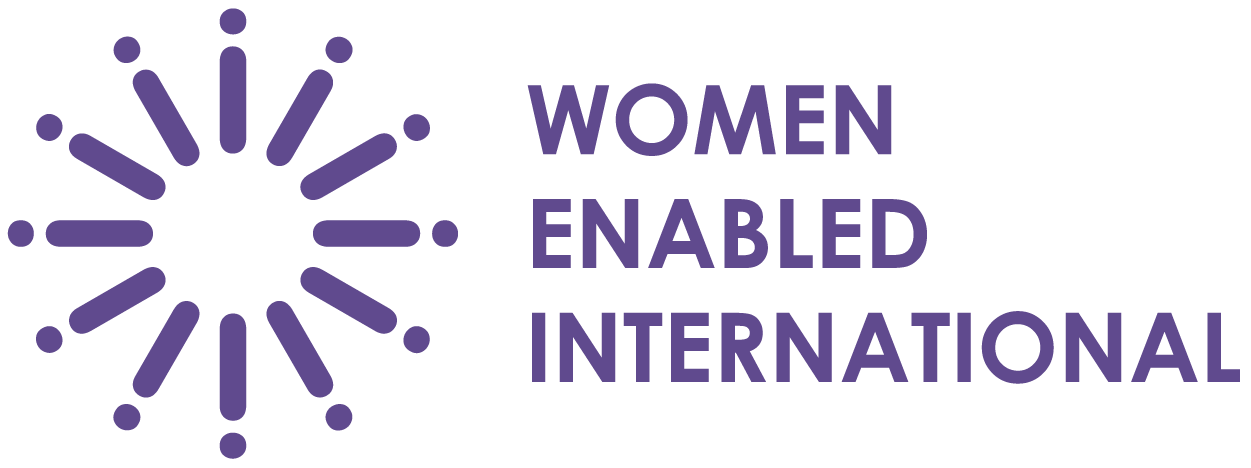How We Work
Women Enabled International works at the intersection of gender and disability.
Key Issues
WEI focuses on priority issues that align with our expertise and where we see the greatest potential for impact.
Sexual and Reproductive Health and Rights
Everyone has the right to make decisions about their bodies and their lives, including about when and with whom to have sex and whether to have children. Women, girls, and gender non-conforming persons with disabilities are just as likely to be sexually active as non-disabled peers and have the same sexual and reproductive health needs. Yet harmful stereotypes often lead to denials of the information and opportunity to exercise these rights.
For example, women, girls, and gender non-conforming people with disabilities:
- Are seldom provided with accessible sexual and reproductive health information and sexuality education.
- Experience higher rates of involuntary sterilization, contraception, and abortion.
- Are less likely to be offered contraceptive information and services to prevent STIs and unplanned pregnancies.
WEI works to ensure that States respect the full range of sexual and reproductive health and rights, including bodily autonomy and the right to parent. WEI provides technical guidance to promote disability- and gender-inclusive health services.
Gender-Based Violence
Everyone has the right to live free from violence, exploitation, and abuse. Yet women, girls, and gender non-conforming persons experience violence at disproportionate rates, based on factors specifically resulting from their gender and disability. For example:
- Women and girls with disabilities are up to 3x more likely to experience violence.
- Poverty and increased dependence to meet basic needs contributes to high rates of violence.
- Inaccessible hotlines and emergency shelters prevent survivors from escaping abusive situations.
WEI works to hold States accountable for gender-based violence against women, girls, and gender non-conforming persons with disabilities and to ensure that justice systems and services to address gender-based violence are rights-based and gender- and disability-inclusive.
Participation and Inclusion
Women, girls, and gender non-conforming persons with disabilities have a right to a seat at the table on issues that impact them—whether in Parliament, in peace negotiations, or in technical discussions on programs and policy. In practice, though, people living at the intersection of gender and disability are rarely included in decision-making spaces.
- 1 in 5 women worldwide is a woman with a disability.
- Physical, information and communication barriers can prevent women, girls, and gender non-conforming persons with disabilities from equal participation.
- Efforts to include women, girls, and gender non-conforming persons with disabilities are too often tokenistic due to inadequate budgeting and planning.
WEI provides women, girls, and gender non-conforming persons with disabilities with tools to ensure their participation in international, regional, and national spaces. WEI also advocates with—and provides technical guidance to—States and international organizations around the world to promote meaningful participation and inclusion.
Discrimination, Equality, Stigma, and Stereotyping
Everyone has the right to be free from discrimination, including based on their gender, disability, race, age, and many other factors. Women, girls, and gender non-conforming persons with disabilities experience discrimination at the intersection of gender and disability that further exacerbates inequalities in all areas of their lives. For example:
- As few as 1% of women with disabilities around the world are literate.
- Only 1 in 4 women with disabilities worldwide are employed in the formal workforce.
- Women, girls, and gender non-conforming people with disabilities are regularly seen as incapable of making their own decisions.
WEI works to dismantle discrimination, stigma, and stereotypes to ensure substantive equality for women, girls, and gender non-conforming persons with disabilities.
Accountability and Access to Justice
When violations of rights occur, it is imperative that individuals can hold their States accountable and have access to justice to repair the violations committed against them. This accountability can take place with a group of experts at the United Nations or in the local or national courtroom. Yet, women, girls, and gender non-conforming persons with disabilities encounter numerous barriers to accessing accountability mechanisms. For example, they:
- Lack access to essential information about their rights and accountability mechanisms.
- Are more likely to be excluded from legal protection and to have their credibility questioned.
- Fear institutionalization or removal of their children if they try to access the justice system.
WEI seeks to hold States accountable for human rights violations against women, girls, and gender non-conforming persons with disabilities and to ensure their access to justice.
Rights-Based Advocacy
Women Enabled International advances human rights at the intersection of gender and disability to: respond to the lived experiences of women and girls with disabilities; promote inclusion and participation; and achieve transformative equality.
Advocate
Collaborate
Educate
Selected Partner Spotlights
UNITED KINGDOM
POLAND
Our Work with the United Nations
WEI works with partner organizations around the world to advocate with United Nations human rights experts, agencies, and Member States to advance the human rights of women, girls, and other gender minorities with disabilities. From providing human rights experts with the information they need to hold States accountable, to organizing women and other gender minorities with disabilities to participate in important international discussions on gender equality such as the Generation Equality Forum, our work at the UN ensures that:
- Human rights standards reflect and respond to the lived experiences of women, girls, and other gender minorities with disabilities;
- Human rights abuses at the intersection of gender and disability are not overlooked; and
- Individuals working at the intersection of gender and disability have a seat at the table in international spaces and conversations that affect them.
Our Response to COVID-19
In August 2020, WEI partnered with UNFPA, UN Women, and seven women-with-disability-led organizations.
Global Map of Advocates
Connect with advocates for the rights of women and persons with disabilities.
